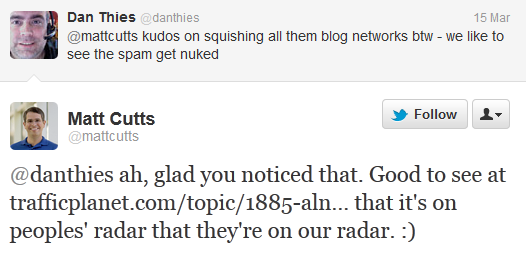Patience is a Virtue
Sorry I haven't blogged as much lately, but one of our employees recently had a child and Google sending out so many warning messages in webmaster central has created a ton of demand for independent SEO advice. Our growth in demand last month was higher than any month outside of the time a few years ago when we announced we would be raising prices and got so many new subscribers that I had to close down the ability to sign up for about 3 or 4 months because there were so many new customers.
Google has been firing on all cylinders this year. They did have a few snafus in the press, but those didn't have any noticeable impact on user perception or behavior & Google recently rolled out yet another billion Dollar business in their consumer surveys.
Google is doing an excellent job of adding friction to SEO & managing its perception to make it appear less stable, less trustworthy and to discourage investment in SEO. They send out warnings for unnatural links, warnings for traffic drops, and even warnings for traffic increases.
Webmaster Tools is a bit of a strange bird...
- Any SEO consultant who has client sites tied into Webmaster Tools makes it easy to connect them together (making any black swan editorial decisions far riskier).
- Any SEO company which has clients sign up for their own Webmaster Tools account now has to deal with explaining why things change, when many of the changes that happen are more driven by algorthmic shifts (adding local results to the SERPs or taking them away, other forms of localization, changing of ad placement on the SERP, etc.) than by the work of the SEO. This in turn adds costs to managing SEO projects while also making them seem less stable (even outside of those who were use paid link networks). Think through the sequence...
- Google first sends a warning for traffic going up, and the SEO tells the client that this is because they did such a great job with SEO.
- Then Google sends a warning for traffic dropping & the client worries that something is wrong.
- The net impact on actual traffic or conversions could be a 0, but the warnings amplify the perception of changes.
- Any SEO who doesn't use Webmaster Tools loses search referral data. It first started with logged in Google users, but apparently it is also headed to Firefox. Who's to say Google Chrome & Safari won't follow Firefox at some point?
Google has changed & obfuscated so many things that it is very hard to isolate cause and effect. They have made changes to how much data you get, changes to their analytics interface & how they report unique visitors, changes to how tightly they filter certain link behaviors, they have rolled in frequent Panda updates, and they have nailed a number of the paid link networks.

BuildMyRank shut down after leaving a self-destructive footprint that made it easy for Google to nuke their network, and some of the remaining paid link networks are getting nailed. Some of their customers are at this point driven primarily by fear, counting down their remaining days as the sky is falling. Fear is an important emotion designed to protect us, but when it is a primary driver we risk self-destruction.
The big winners in these moves by Google are:
- Google, since they grant themselves more editorial leeway. If everyone is a scofflaw then they can hit just about anyone they want. And the organic search results are going to be far easier to police if many market participants are held back by a fear tax.
- Larger businesses which are harder to justify hitting & which can buy out smaller businesses at lower multiples based on the perception of fear.
- Sites which were outranked by people using the obvious paid links, which now rank a bit better after some of those paid link buyers were removed from the search results.
- SEOs who out others & market themselves by using polarizing commentary (at least in the short run, whereas in the long run that may backfire).
- Those engaging in negative SEO, which sell services to smoke competitors.
The big losers from these Google moves are:
- some of the paid link networks & those who used them for years
- under-priced SEO service providers who were only able to make the model work by scaling up on risk
- smaller businesses who are not particularly spammy, but are so paralyzed by fear that they won't put in enough effort & investment to compete in the marketplace
One of the reasons I haven't advocated using the paid link networks is I was afraid of putting the associated keywords into a hopper of automated competition that I would then have to compete against year after year. Even if you usually win, over the course of years you can still lose a lot of money by promoting the creation of disposable, automated & scalable competing sites. If you don't mind projects getting hit & starting over the ROI on such efforts might work out, but after so many years in the industry the idea of starting over again and again as sites get hit is less appealing.
It is not just that the links are not trusted, but now they stand a far greater chance of causing penalties:
Dear site owner or webmaster of ….
We’ve detected that some of your site’s pages may be using techniques that are outside Google’s Webmaster Guidelines.
Specifically, look for possibly artificial or unnatural links pointing to your site that could be intended to manipulate PageRank. Examples of unnatural linking could include buying links to pass PageRank or participating in link schemes.
We encourage you to make changes to your site so that it meets our quality guidelines. Once you’ve made these changes, please submit your site for reconsideration in Google’s search results.
If you find unnatural links to your site that you are unable to control or remove, please provide the details in your reconsideration request.
If you have any questions about how to resolve this issue, please see our Webmaster Help Forum for support.
Sincerely,
Google Search Quality Team
If that doesn't change then negative SEO will become a bigger issue than paid links ever were.
What is hard about Google penalizing websites for such links is that it is cheap & easy for someone else to set you up. Shortly after Dan Thies mentioned that it was "about time" to Matt Cutts on Twitter someone started throwing some of the splog links at his site. It is safe to say that Dan didn't build those links, but there are many people who will be in the same situation as Dan who did nothing wrong but had a competitor set them up.
And there is no easy way to disconnect your site from those types of links.
If you go back a few years, it was quite easy to win at SEO by doing it in a "paint by number" fashion. One rarely got hit unless they were exceptionally excessive and stuck out like a sore thumb.

But after all of Google's recent moves, a few missed steps in a drunken stupor can have the same result.

Now more than ever, patience is a virtue!





Comments
I totally agree, patience might be the most important virtue. I remember years ago when I was telling people "focus on building natural links" rather than using services like BMR, just a few people agreed with me. Well... patience really is a virtue.
To clear things out, I'm not happy for BMR's shutdown, but it is always good to stay away from the gray/dark side!
If shady backlinks can hurt, then you need "whitehat" backlinks that defend your reputation. I think sites that have great content - but not many great backlinks - are vulnerable to negative SEO. I'm talking about great content as in great products that may not garner the social reaction that a controversial / chatty blog would get, but perhaps an e-commerce site that sells very niche (and boring to the non-niche audience) products like nuts and bolts. These sites struggle to win truly quality backlinks purely through natural linking, and usually the site owner is absolutely oblivious to SEO (i.e. most enthusiasts who love what they do have no interest in marketing).
That kind of site is ripe for a $20 (or whatever small cash amount) negative SEO campaign on a dodgy network. Google de-indexes the link network, sees the e-commerce site has a bunch of shady links on the de-indexed link network, and only the odd non-shady one pointing to the e-commerce site, and then it sees the site itself as dodgy. The site owner has no clue what's happening and has no chance to find the offending links to mitigate and expunge his "guilt" (of a crime he didn't do).
Links are cheap, and Google have just created a huge market for "bad links" - maybe it's easier to disrupt those above you than to try and out-rank them via positive SEO.
I think all site owners will need to spend big on authority links (business.com, yahoo! directory etc) just to defend themselves from dirty links.
BMR was successful because it was relatively cheap and "mechanical" to link build for such "non-sexy" sites for very specific keywords. Let's face it, links work and these networks worked because of the weaknesses in Google's algorithm that have been around since 1998, and still very much exist today.
Add new comment